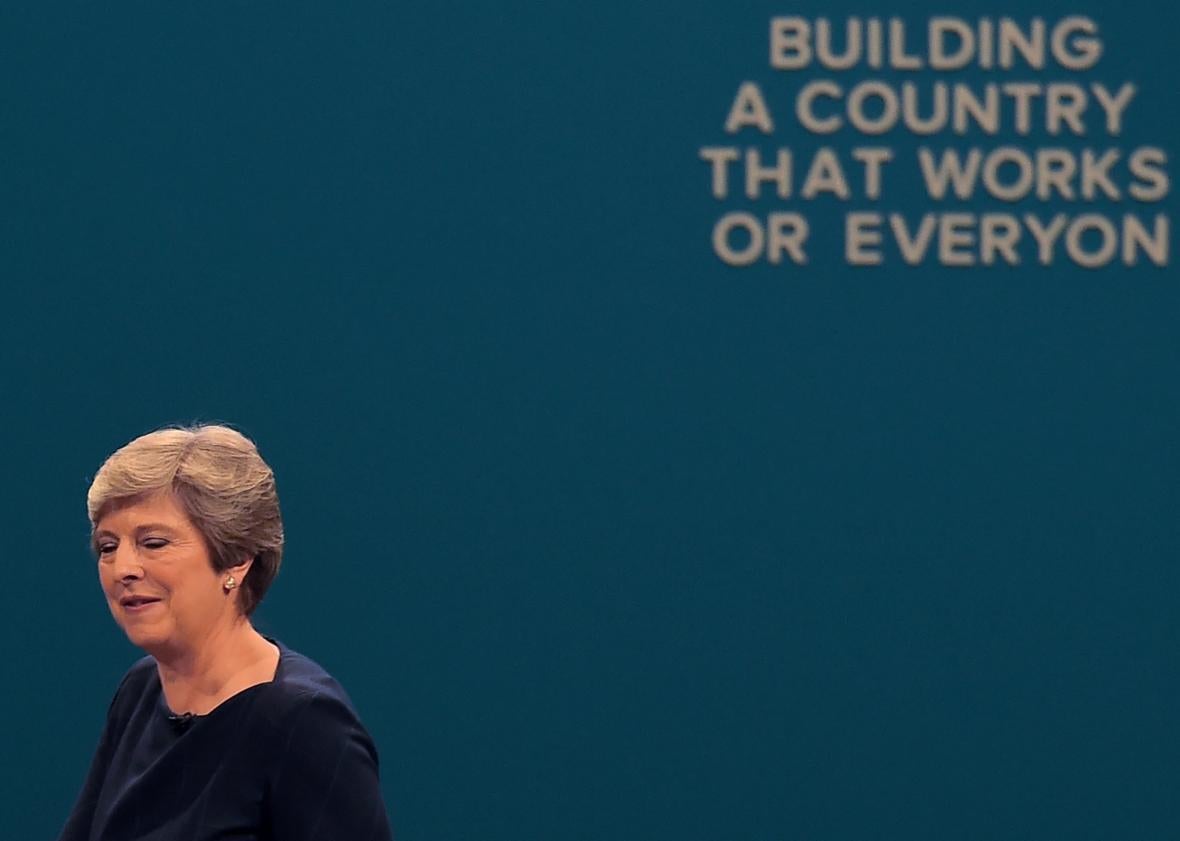Americans who feel like their country is uniquely beset by scandals involving sleaze, incompetence, sexual harassment, and shady contacts with foreign governments might want to look at what’s going on in Britain. Here’s a brief round-up:
Last week, Defense Minister Michael Fallon, a senior member of Prime Minister Theresa May’s Conservative Party, resigned over sexual harassment allegations. Fallon had apologized for repeatedly touching a radio presenter’s knee in 2002, and there have been a number of other allegations against him which he hasn’t yet addressed. Fallon may not be the only senior politician forced out amid growing post-Weinstein attention to the culture of sexual harassment in the British Parliament. A number of MPs have been suspended or are under investigation. May’s most senior minister, First Secretary of State Damian Green, has been accused of sending a suggestive text message to a colleague and keeping pornography on an office computer.
Then on Wednesday, May lost her second Cabinet minister in a week when International Development Secretary Priti Patel, considered a rising star in the party, stepped down after it was reported that she had held 12 undisclosed meetings with senior Israeli officials, including Prime Minister Benjamin Netanyahu, during what was supposedly a family holiday over the summer. Patel had met with May on Monday, but the final straw came the next day when it was revealed that she had failed to inform the prime minister that she had discussed a controversial proposal to provide U.K. aid funding to the Israeli army. Patel has apologized for the meetings as well as for giving the impression in public statements that Foreign Secretary Boris Johnson knew about the meetings in advance.
As for Johnson, he has other things to worry about. The voluble foreign secretary is accused of putting a British citizen imprisoned in Iran at even greater risk by saying in Parliament last month that she had been “simply teaching people journalism.” Nazanin Zaghari-Ratcliffe, who is of Iranian descent, is an employee of the Thomson Reuters Foundation, the charitable arm of the Thomson Reuters news agency, but is not a journalist, and her employers say she was not involved in teaching journalism. The foundation does not operate in Iran. She was arrested in April while visiting her grandparents in Iran with her 2-year-old daughter and accused of sedition by the country’s Revolutionary Guards. She was sentenced to five years in prison in September. After Johnson’s statement, she was reportedly taken to a new court hearing where his words were used as evidence that she was involved in “propaganda against the regime.”
And last but not least, the Queen herself is under scrutiny after the leaked Paradise Papers showed that her estate had invested $13.1 million in offshore tax havens in Bermuda and the Cayman Islands. This isn’t actually illegal, and the queen herself probably didn’t know about it, experts say, but it’s pretty embarrassing for the 91-year-old monarch.
Any one of these would have been a major scandal. Combined, they form an overwhelming stench of decay and dysfunction around a government that was not on the firmest footing to begin with. A poor showing in a snap election in June left May’s Tories short of a majority and dependent on a small Northern Irish party to stay in power. A much-touted speech by the prime minister to a party congress last month, which was supposed to right the ship, turned into a comically embarrassing fiasco.
And all this may eventually look minor compared with the government’s struggle to handle its largest looming crisis: the impending withdrawal of Britain from the European Union. Parliamentary debate over the government’s EU Withdrawal Bill has been delayed due to demands for more than 300 amendments from MPs. The massive bill is a crucial piece of the Brexit plan—it signs existing EU regulations into domestic British law to avoid a scenario where thousands of existing regulations are eliminated overnight, throwing the economy into chaos. The government is controversially using what are called “Henry VIII powers” to push through amendments to the bill. Despite the name, the Financial Times assures readers that these are “used all the time in sensible, non-despotic ways.” Not everyone is convinced. Labour leader Jeremy Corbyn opposes the bill, calling it a power grab by ministers, but his party is divided on whether to try to block it.
Meanwhile, talks between Britain and the EU over the post-Brexit relationship are likely to be delayed over disagreements on the rights of EU citizens in Britain and the so-called “divorce bill”—France and Germany insist Britain is obligated to pay tens of millions of euros to Brussels. Some pro-Brexit lawmakers have acknowledged that this is true, but others insist Britain shouldn’t pay a cent. May is now hinting that Britain could miss the March 2019 deadline for leaving the EU, which European leaders are insisting is not an option. Things will get even more complicated if, as many EU leaders now reportedly expect, May’s government collapses amid the mounting scandals.
Meanwhile, the whole Brexit exercise is looking shadier with lawmakers raising questions about Russian influence and suspicious funding in the run-up to the 2016 referendum. Whatever the truth of that, British leaders have certainly done a perfectly fine job sabotaging themselves since then.
